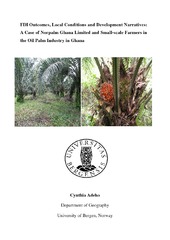| dc.description.abstract | Foreign Direct Investments (FDI) in the Ghanaian economy has increased tremendously since 1983 when the country adopted neo-liberal economic policies. In order to take advantage of the globalization processes, FDI is represented as a way of increasing capital investments and reducing poverty rates in Ghana. More generally, FDI in agriculture is viewed as an effective poverty reduction tool and a medium for economic growth, especially in rural areas of the developing countries where majority of the world’s peasant farmers live. In an era characterized by an increasing spatial interconnectedness and flows of capital across national borders, FDI has emerged as a development strategy since the 1950s. However, critics argue that FDI often tend to worsen the poverty situation in developing countries rather than creating any economic improvements. This argument is exemplified by the way investing economies accumulate and transfer wealth out of developing countries without generating many benefit to them. The broad generalization of the outcome of FDI however fails to consider its spatial context and other cultural specificities. Undoubtedly, differences between and within developing countries in terms of economic policies, ecological conditions, political and social systems among others interact with FDI to generate differentiated outcomes. This study focuses on a Norwegian company, Norpalm Ghana Limited (hereafter called Norpalm), that invested in the oil palm industry in Ghana since 2000. Norpalm has cultivated approximately 11,300 acres of land and adopts a nucleus estate production model that integrates smallholders (oil palm farmers who have contractual agreements to access land, farm inputs, credit from Norpalm and in turn supply their oil palm bunches to them) and outgrowers (oil palm farmers wo do not have contractual agreements with Norpalm and may supply their oil palm bunches to Norpalm based on price incentives). This investment is located in rural farming communities dominated by small-scale farmers who are often constrained by limited access to farmland, farm inputs, and ready markets for their oil palm bunch. As a typical case of FDI in agriculture, this study examines the outcomes of Norpalm’s smallholder and outgrower schemes and the local conditions that account for these outcomes. The specific objectives of the study are to examine 1) the enabling factors for Norpalm’s investment in the oil palm industry in Ghana; 2) the outcomes of Norpalm’s smallholder scheme to the company and the smallholders; 3) the outcomes of Norpalm’s outgrower scheme to the company and the outgrowers; 4) the local conditions that account for the outcomes of these schemes. An analytical framework that defines FDI as consisting of economic capital, actors and knowledge is adopted to analyze the outcomes of Norpalm’s smallholder and outgrower schemes and the local conditions that account for the specific outcomes of the schemes (Fløysand and Barton, 2014). The study takes the post-structuralist approach to development and the concepts of ‘land transactions’, ‘land grabbing’ and ‘contract farming’ to analyze the findings. Using a case study approach, the study uses primary and secondary data sources. Interviews, informal conversations, personal observations and review of secondary data were varied methods that were used to document the enabling factors that led to Norpalm’s investment in the oil palm industry in Ghana and the differentiated outcomes of the schemes for Norpalm, smallholders and outgrowers. The study found that Ghana’s Structural Adjustment Programme; modern oil palm processing technology used by Norpalm and the company’s quest to maximize this technology and increase their market share were the major factors that were conducive for Norpalm’s investment in the oil palm industry in Ghana. Though Norpalm integrated smallholders and outgrowers into its production after acquiring formerly state-owned oil palm company, National Oil Palms Limited, there are differentiated outcomes for the smallholders and outgrowers. The smallholders’ accessed lands, farm inputs, credits, markets for their oil palm bunches and improved farming techniques or knowledge from Norpalm. In most cases, Norpalm in turn recorded an increase in total quantity of oil palm bunches harvested from the smallholders due to a guaranteed supply of oil palm bunches. On the contrary, the outgrowers were unable to access farm inputs, credits, improved farming techniques or knowledge from Norpalm. Consequently, Norpalm experienced a reduction in the supply of oil palm bunches from the outgrowers compared to that of the smallholders. The positive outcome of the smallholder scheme to both Norpalm and smallholders is termed FDI as trickling down effects whereas the outcome of the outgrower scheme to Norpalm and the outgrowers is termed as FDI as backwash effects. The predominantly customary land ownership system in Ghana and the level of farmer-based organizations were local conditions identified to account for the differentiated outcomes of Norpalm’s smallholder and outgrower schemes. The thesis therefore argues that an analysis of outcomes of FDI should go beyond ‘development’ and ‘dependency’ to consider specific local conditions present in the investment environment. | en_US |
